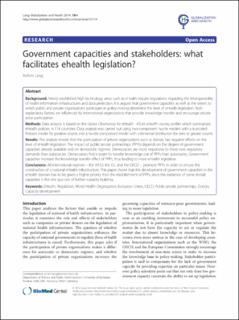Bitte benutzen Sie diese Kennung, um auf die Ressource zu verweisen:
https://doi.org/10.21256/zhaw-17894| Publikationstyp: | Beitrag in wissenschaftlicher Zeitschrift |
| Art der Begutachtung: | Peer review (Publikation) |
| Titel: | Government capacities and stakeholders : what facilitates ehealth legislation? |
| Autor/-in: | Lang, Achim |
| et. al: | No |
| DOI: | 10.1186/1744-8603-10-4 10.21256/zhaw-17894 |
| Erschienen in: | Globalization and Health |
| Band(Heft): | 10 |
| Heft: | 4 |
| Erscheinungsdatum: | 13-Jan-2014 |
| Verlag / Hrsg. Institution: | BioMed Central |
| ISSN: | 1744-8603 |
| Sprache: | Englisch |
| Fachgebiet (DDC): | 362: Gesundheits- und Sozialdienste |
| Zusammenfassung: | Background: Newly established high-technology areas such as eHealth require regulations regarding the interoperability of health information infrastructures and data protection. It is argued that government capacities as well as the extent to which public and private organizations participate in policy-making determine the level of eHealth legislation. Both explanatory factors are influenced by international organizations that provide knowledge transfer and encourage private actor participation. Methods: Data analysis is based on the Global Observatory for eHealth – ATLAS eHealth country profiles which summarizes eHealth policies in 114 countries. Data analysis was carried out using two-component hurdle models with a truncated Poisson model for positive counts and a hurdle component model with a binomial distribution for zero or greater counts. Results: The analysis reveals that the participation of private organizations such as donors has negative effects on the level of eHealth legislation. The impact of public-private partnerships (PPPs) depends on the degree of government capacities already available and on democratic regimes. Democracies are more responsive to these new regulatory demands than autocracies. Democracies find it easier to transfer knowledge out of PPPs than autocracies. Government capacities increase the knowledge transfer effect of PPPs, thus leading to more eHealth legislation. Conclusions: All international regimes – the WHO, the EU, and the OECD – promote PPPs in order to ensure the construction of a national eHealth infrastructure. This paper shows that the development of government capacities in the eHealth domain has to be given a higher priority than the establishment of PPPs, since the existence of some (initial) capacities is the sine qua non of further capacity building. |
| URI: | https://digitalcollection.zhaw.ch/handle/11475/17894 |
| Volltext Version: | Publizierte Version |
| Lizenz (gemäss Verlagsvertrag): | CC BY 2.0: Namensnennung 2.0 Generic |
| Departement: | School of Management and Law |
| Organisationseinheit: | Institut für Verwaltungs-Management (IVM) |
| Enthalten in den Sammlungen: | Publikationen School of Management and Law |
Dateien zu dieser Ressource:
| Datei | Beschreibung | Größe | Format | |
|---|---|---|---|---|
| Government capacities_2014_SC 1.1.pdf | 815.61 kB | Adobe PDF |  Öffnen/Anzeigen |
Zur Langanzeige
Lang, A. (2014). Government capacities and stakeholders : what facilitates ehealth legislation? Globalization and Health, 10(4). https://doi.org/10.1186/1744-8603-10-4
Lang, A. (2014) ‘Government capacities and stakeholders : what facilitates ehealth legislation?’, Globalization and Health, 10(4). Available at: https://doi.org/10.1186/1744-8603-10-4.
A. Lang, “Government capacities and stakeholders : what facilitates ehealth legislation?,” Globalization and Health, vol. 10, no. 4, Jan. 2014, doi: 10.1186/1744-8603-10-4.
LANG, Achim, 2014. Government capacities and stakeholders : what facilitates ehealth legislation? Globalization and Health. 13 Januar 2014. Bd. 10, Nr. 4. DOI 10.1186/1744-8603-10-4
Lang, Achim. 2014. “Government Capacities and Stakeholders : What Facilitates Ehealth Legislation?” Globalization and Health 10 (4). https://doi.org/10.1186/1744-8603-10-4.
Lang, Achim. “Government Capacities and Stakeholders : What Facilitates Ehealth Legislation?” Globalization and Health, vol. 10, no. 4, Jan. 2014, https://doi.org/10.1186/1744-8603-10-4.
Alle Ressourcen in diesem Repository sind urheberrechtlich geschützt, soweit nicht anderweitig angezeigt.